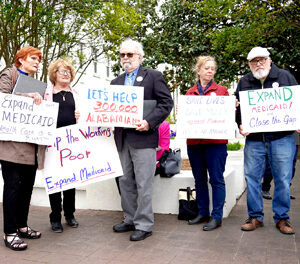
(Photo by Taylor Wright on Unsplash)
By Mylika Scatliffe
Special to the AFRO
#AFRONewsAtNoon
Black Lives Matter. Events over the last few years have made this phrase a household term (positive or negative depending on who you ask); when we hear it the first thought is usually of Black men and boys. Rightfully so, but Black women matter too. To that end, the Energy Commerce Committee’s Build Back Better Act legislation includes historic, financial investments from the Black Maternal Health Momnibus Act to save mothers’ lives, end racial and ethnic disparities, and advance birth equity across the country.
What does this really mean? In a perfect world, all women would be viewed the same throughout pregnancy, childbirth and the postpartum period. Babies get in and out of our bellies the same way. However Black women are 3-4 times more likely than White women to die from pregnancy related complications, and experience poor birth outcomes, regardless of education level or socioeconomic status. Black women with advanced college degrees have poorer outcomes than White women who didn’t finish high school, suffering pregnancy related complications such as pre-eclampsia, blood clots and infections.
These complications and deaths are largely preventable. The CDC determined the impact of systemic discrimination, as well as implicit bias from medical professionals leaves Black women vulnerable concerning America’s ongoing maternal mortality crisis. In other words, as stated by a public health nurse with 30+ years’ experience, “It’s not a matter of race, but racism.” One might wonder how racism affects having a baby; prenatal care, giving birth and postpartum recovery are all a matter of biology. The answer is that all instances of racism and discrimination in the medical setting are not overt. Some aren’t even consciously committed by medical professionals – which is where implicit bias comes in.
Countless factors affect maternal outcomes. Social determinants like housing, nutrition, and environmental stressors disproportionately affect Black women’s health even before they get pregnant. They may be suffering from chronic conditions such as diabetes, obesity and hypertension because they live in a food desert, in substandard housing, perhaps in an area with high crime. Now imagine a woman in one or more of these circumstances going to her first prenatal appointment. She lives in a large, urban, East Coast city, is obese and has high blood pressure. Protocol states her doctor should ask questions about her medical history, medications, and the like, and she should immediately receive a referral to a nutritionist and advice on the appropriate amount of pregnancy weight gain. She receives none of these; there’s no documentation in her medical notes about why these things weren’t done; just a disparaging remark about her weight and the fast-food meal she brought to her appointment. The doctor might assume she won’t take care of herself or her baby, never considering maybe she consumed the fast food because she was in a rush, had not eaten all day but wished to be on time for her appointment.
Consider the mother in an upper Midwest state, a few days postpartum, who suffers from sickle cell anemia and therefore is in a lot of pain. In requesting pain management, she’s treated as if she’s drug seeking, and is expected to grit her teeth and bear the pain without complaint. She notices White postpartum patients, who are experiencing pain, are swiftly given pain medication to minimize suffering, without skeptical speculations about motives. Or the west coast patient suffered a miscarriage at 20 weeks. Understandably distraught and in tears, she asks a lot of questions about why it happened, to be told only hours later that she “should just move on.”
These attitudes are pervasive. The comments, attitudes, and verbiage may vary slightly depending on the region of the country, but the meaning is alarmingly the same. As mentioned earlier, a Black woman’s socioeconomic, educational, or professional status doesn’t affect implicit bias. Tanya Bell, a labor and delivery nurse, recalls her harrowing experience after the birth of her second child. She delivered via C-section, and a few days postpartum felt extreme pain, and knew something was just not right. She called her obstetrician and went to the emergency room. Her concerns and assertions that something was very wrong were dismissed and she was sent home with a stool softener and antibiotic. The next day, she awakened disoriented and with a fever of 105 degrees. She fell to the floor, semi-conscious. She was able to pull it together just enough to call 911 and was rushed to a different hospital. There it was discovered she had an infected blood clot and had to have emergency surgery to repair the damage. It’s frightening to think about how much time was wasted while her concerns were basically ignored, and what could have happened if she hadn’t gotten help in time.
Not even Black women of celebrity status are spared, if Serena Williams’ birth story as she told Vogue magazine, is any indication. She had a previous history of blood clots and suffered one shortly after giving birth. She suddenly became short of breath and recognizing the symptoms immediately told her doctors she needed a CT scan with contrast and Heparin. Her concerns were initially dismissed. Only after she vehemently insisted and time was wasted with a test that did not show anything, that they finally performed the CT scan which confirmed what she told them in the first place.
The biggest complaint among Black women, relating to their maternal health, no matter if they are in urban, suburban, or rural areas, is they feel as if they are not heard. Their questions, concerns, complaints, even urgent pleas when they know something isn’t right with their bodies, their recovery, their babies are ignored and/or dismissed. Black maternal mortality rates have increased over the last three decades, making the Momnibus Act and its unprecedented amount of funding extremely timely. It’ll provide millions of dollars in funding for among other things:
- Local entities to address social determinants of maternal health like housing, nutrition, and environmental conditions – including a minimum of $75 million exclusively for community-based organizations working to promote maternal health equity.
- To grow and diversify the perinatal workforce, including nurses, doctors, doulas, and maternal mental and behavioral health professionals – including $50 million specifically for doulas.
- To advance maternal health research at Minority -Serving Institutions like HBCUs, Tribal Colleges and Universities, Hispanic-Serving Institutions, and AAPISIs.
- Bias training among health care professionals.
- Promotion of representative community engagement in Maternal Mortality Review Committees.
Last year, the Centers for Disease Control (CDC) launched HEAR HER, a national campaign that brings attention to pregnancy related deaths and provides education and encouragement to pregnant women within the first year of delivery. According to the CDC website, “The campaign seeks to raise awareness of potentially life-threating warning signs during and after a woman’s pregnancy. Hear Her will empower pregnant and postpartum women to speak up when something doesn’t feel right, and encourage the people supporting them to listen carefully and act when they hear their concerns.”
Meanwhile, what can you do to advocate for yourself?
- Make notes as things are happening. Write down all your questions prior to meeting with your doctor.
- Take somebody with you, someone who will advocate on your behalf if you are afraid, confused, or unable to speak for yourself.
- Have a plan for your birth, and what you will do if you are away from your medical facility, and something goes wrong, i.e., how you will get there in an emergency.
- Speak up. Don’t be afraid to vocalize your concerns, repeatedly, if necessary, until someone listens.
- Switch providers if your provider is impatient, dismissive, refuses to answer questions, or you don’t feel comfortable. Bed sure to provide feedback about why you’re leaving.
Learn more about the Hear Her campaign, and information for pregnant and postpartum women at cdc.gov/hearher.
Help us Continue to tell OUR Story and join the AFRO family as a member – subscribers are now members! Join here!
The post The Black Maternal Health Momnibus Act addresses racial disparities, and birth equity appeared first on AFRO American Newspapers .









